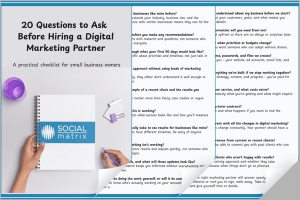You’ve finally decided you need help with your marketing. Maybe you’re tired of posting on social media with nothing to show for it, or your last attempt at Facebook ads was a disaster. Whatever brought you here, you’ve decided it’s time to find a digital marketing partner.
But how do you choose the right person or agency when you don’t really understand what they do? How do you tell the difference between someone who’ll transform your business and someone who’ll just take your money?
This guide will walk you through everything you need to know to choose a digital marketing partner who can help your business grow.
Understanding Your Options: Types of Digital Marketing Partners
Before you start evaluating anyone, it helps to understand what’s out there. Digital marketing partners come in different shapes and sizes, and knowing your options helps you figure out what might work best for your business.
Individual Consultants and Freelancers
These are solo professionals who work directly with you. They might specialise in one area like social media or Google ads, or they might offer a broader range of services.
The good news? You’ll get personal attention and often more affordable rates. They’ll usually get to know your business well and care about your success because you’re important to their income.
The downside? You’re putting all your eggs in one basket. If they go on holiday, get sick, or leave for another opportunity, your marketing stops. You’re also limited by what one person can realistically handle and the scope of their skillset. If your business grows or you need expertise in multiple areas, you’ll quickly outgrow what they can offer.
Individual consultants work well if you have a specific challenge (like “I need help with Facebook ads”) or if you want someone who’ll become part of your team.
Small Marketing Agencies
These are teams of 2-10 people who offer multiple services. You get the best of both worlds – personal attention from people who know your business, plus the security of a proper team behind your marketing.
Small agencies have specialists in different areas, so you’re not limited by one person’s skillset. If your main contact is away, someone else can step in. They’re also more invested in building long-term relationships because small business clients matter to their success.
The investment is usually higher than an individual, but you get much more reliability and expertise for your money. Most small businesses find this the sweet spot – professional service without the corporate bureaucracy.

Large Marketing Agencies
These are the big players with more than 20 employees, fancy offices, and impressive client lists. They can handle complex projects and have specialists for everything.
For most small businesses, large agencies are overkill. They’re expensive, you’ll often feel like a small fish in a big pond, and their processes are usually designed for bigger clients with bigger budgets.
Local vs Remote Digital Marketing Partner
Location matters less than it used to, but there are still important considerations. Local partners understand your market, can meet face-to-face when needed, and work in your time zone. This makes communication easier and relationship-building stronger.
Remote partners might offer different pricing, but the quality and expertise varies enormously depending on who they are and where they’re based. You’ll also need to consider potential challenges like language barriers, cultural differences, and working across time zones.
The choice comes down to what works for your business. Do you value the convenience and familiarity of working with someone local, or are you comfortable managing a remote relationship if you find the right partner?
What Makes a Great Digital Marketing Partner
Once you understand your options, you need to know what separates the great partners from the ones you should avoid. Here’s what to look for, and what should send you running.
How They Approach Your Business
The right digital marketing partner won’t pitch you a solution in the first meeting. Instead, they’ll focus on learning about your business – how it works, who your ideal customers are, what’s been effective in the past, and what sets you apart from your competitors. They’ll also want to know what success looks like for you.
If someone skips this step and sends you a proposal straight away, that’s a major red flag. Every business is different, and a one-size-fits-all approach simply doesn’t deliver results.
The best partners take the time to understand what matters to you before recommending any strategy.
How They Communicate
You don’t need to be a marketing expert, and the right digital marketing partner won’t make you feel like you should be. Pay attention to how they explain things in early conversations. Do they use plain language, break down complex terms, and show you how their ideas link to your business goals?
During the selection process, notice how responsive they are. Do they answer questions clearly and promptly? Do they explain both the opportunities and the challenges without dodging the details?
These first interactions set the tone. If communication feels easy and straightforward before you sign, it’s a good sign it will continue that way once you start working together.

What They Promise
A trustworthy digital marketing partner will be upfront with you from the start. They’ll explain what’s realistic for your budget, how long things may take, and any challenges you might face.
They’ll back up their advice with examples of past results, but they won’t claim you’ll get identical outcomes. Every business is different, and honest partners know that.
Be cautious of anyone offering guarantees or making bold claims like “Double your sales in 30 days” or “First page of Google in a week.” Marketing doesn’t work that way. Results take time, and factors such as competition, market conditions, and platform changes can all influence the outcome.
If a partner can’t explain this clearly, they’re not the right fit. The best ones are transparent, realistic, and committed to steady, sustainable growth.
How They Handle Control and Ownership
You should always own your website, social media accounts, customer data, and any other digital assets. A good digital marketing partner will not only respect this but insist on it.
They’ll give you full access and ensure you understand what they’re doing, so you stay in control of your business. Their goal is to support you, not make you dependent on them.
If a partner tries to keep ownership of your accounts or says, “Don’t worry, we’ll handle everything, you don’t need access,” treat it as a deal-breaker.
Your business belongs to you, and you should never hand over that control.
Partnership Mindset vs Sales Tactics
You’d be surprised how many marketing people see clients as just monthly payments.
The right partner will genuinely want your business to grow because they understand that your success is their success. They’ll celebrate your wins with you, work with you to solve problems, and be proactive about spotting opportunities for your business.
Be cautious of anyone who tries to pressure you into signing up on the spot with phrases like “This discount is only available today” or “We only have one spot left.” High-pressure sales tactics are a red flag.
A good digital marketing partner is confident in their work. They’ll give you time to decide and happily answer your questions without rushing you.
Checking Their Experience and Results
Before you commit to a digital marketing partner, it’s important to see proof that they can deliver.
Look beyond the surface. A polished portfolio might look impressive, but what really matters are the results they’ve achieved and whether their experience aligns with your business. For example, an agency that mainly works with e-commerce brands may not be the best fit if you run a local service business.
Case studies are one of the best ways to judge a partner’s capabilities. Strong examples will clearly outline the challenge a client faced, the steps taken to address it, and the specific results achieved. Real numbers matter here. Metrics like “a 40% increase in enquiries” or “reducing cost per sale from £15 to £8” are far more meaningful than vanity statistics such as follower counts or website traffic alone.
It’s also important to check what others say about them. Read reviews on Google, social media, and relevant industry directories. A few negative comments are normal, but repeated complaints or similar issues in multiple reviews should make you cautious.
Asking for references from past or current clients can also give you valuable insight. When you speak to them, pay attention not just to what they say, but how they say it. Genuine enthusiasm sounds very different from polite but lukewarm responses. And if a digital marketing partner has no reviews or client references at all, that’s a serious red flag.

Making Your Final Decision
Once you’ve shortlisted a few potential partners, it’s time to choose the one that fits your business best. Here’s how to make a confident decision:
Compare Value, Not Just Price
Avoid the trap of choosing the cheapest option or assuming the most expensive must be best. Look for value instead. A partner who delivers results is far more cost-effective than one who offers bargain rates but poor outcomes.
Be cautious of prices that seem unrealistically low. They often lead to poor-quality work, hidden costs, or partners who disappear when problems arise.
Test with a Small Project
If you’re torn between two strong candidates, start with a smaller project or trial. Many experienced partners are happy to prove their value this way. It’s a low-risk way to see how they communicate, deliver results, and handle challenges before committing long-term.
Set Clear Expectations Early
Once you’ve made your choice, establish a clear working framework:
- Define measurable goals and success criteria
- Agree on how and when you’ll communicate
- Clarify reporting and approval processes
- Outline your budget and avoid scope creep
- Share what you’ll provide in terms of access or input
This clarity upfront prevents misunderstandings and sets the foundation for a strong, productive partnership.
Questions to Ask Before Hiring a Digital Marketing Partner
To help you choose the right digital marketing partner, we’ve created this practical checklist of questions. Use it during your conversations to evaluate how they work and whether they’re right for your business.
Download this checklist and keep it handy during partner selection calls. No email required. Just click and start planning your marketing confidently.

Remember: Good partners will answer these questions openly and honestly. If someone gets defensive or tries to dodge your concerns, that tells you everything you need to know. Take notes and don’t feel pressured to decide on the spot – the best partners will give you time to think.
Final Thoughts
Choosing the right digital marketing partner is one of the most important decisions you can make for your business. Get it right, and you’ll have someone who helps your business grow while taking the marketing pressure off your shoulders. Get it wrong, and you’ll waste time, money, and potentially damage your reputation.
Remember, you’re not just buying services – you’re choosing a partner who’ll represent your business to the world. They should care about your success because they understand that when you win, they win too.
Don’t settle for someone who doesn’t feel right just because you’re tired of doing everything yourself. The right partner is out there – it’s worth taking the time to find them.
Looking for a digital marketing partner who understands small businesses and puts people first? At Social Matrix, we’ve been helping small businesses build meaningful online connections since 2010. We’ll help you strengthen your online presence, attract the right customers, and stay true to the values that make your business unique.
Get in touch today and let’s grow your business, together.
Still curious?
Listen to our companion episode of our Bots & Brains – The Intelligent Marketing Podcast by Social Matrix, where we talk through these 20 essential questions. You’ll hear personal reflections, honest stories, and examples of why each question matters when choosing a digital marketing partner.

